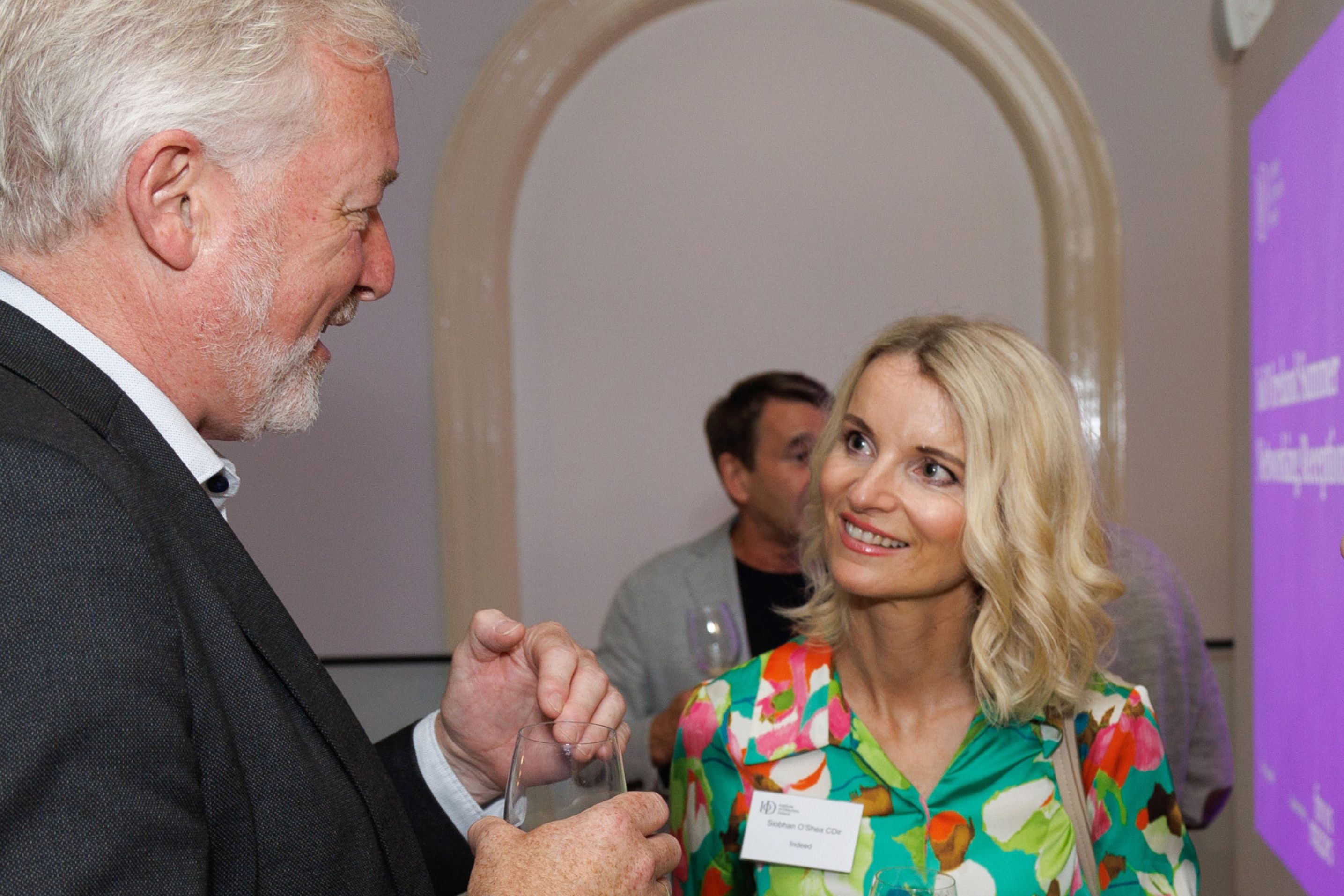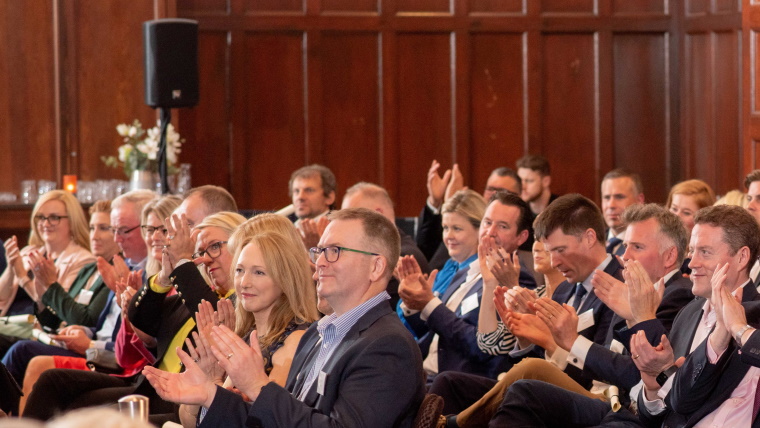
Kevin Potts
Chief Executive, Irish Rugby Football Union (IRFU)
Kevin Potts, IRFU Chief Executive, is a chartered accountant with a breadth of senior business experience at KPMG, Deutsche International, Bank of New York, BNP Paribas, and Mellon Financial Corporation . He joined the IRFU in 2005, becoming its first Chief Operating Officer in 2015.
Tell us more about your background
I was appointed Chief Executive of the Irish Rugby Football Union (IRFU) in December 2021. I’m a chartered accountant by profession, having qualified with KPMG in 1992. Over the next decade, I held senior roles in the funds industry, working at companies like Deutsche International (formerly Morgan Grenfell) and Bank of New York. I also served as Managing Director at BNP Paribas Fund Services Ireland, and in 2003, I became Managing Director of the Irish Funds division at Mellon Financial Corporation (now BNY Mellon).
I joined the IRFU in 2005 and was named Chief Operating Officer in 2015, where I played a key role in the organisation’s operations before stepping into the CEO position.
Rugby has been a big part of my life, both professionally and personally, for nearly five decades. As a player, I represented Guinness RFC, Templeogue College, and spent almost 20 years with St Mary’s College RFC. I also had the honour of earning representative honours with Leinster, Ireland Schools, and Ireland A.
What is the one characteristic that you believe every leader should possess?
I believe the most essential characteristic every leader should possess is empathy. No matter the organisation you lead, if you want to inspire and bring your team with you, empathy is key. A great leader understands that people are different, each facing their own challenges - both inside and outside of work. Recognising this and truly stepping into others’ shoes allows a leader to bring out the best in those around them. For me, leading from the heart and actively listening to my team is a core value. Without heart and empathy, it’s difficult to stay in the game.
Can you describe your journey to becoming Chief Executive of the Irish Rugby Football Union?
I was enjoying a successful career in the funds industry when, in May 2004, I found myself sitting in Kelly’s Hotel in Rosslare, reading an article in The Irish Times about the launch of the IRFU’s first strategic plan. In that moment, it struck me - there could be a career in rugby, not as a player, but on the business side of the game, combining my passion with my professional expertise.
So, in 2005, when a role opened at the IRFU, I made the leap - despite some raised eyebrows from colleagues about the pay cut! From the outset, my ambition was always to become CEO, and I’m incredibly proud to have achieved that goal.
What are the key qualities you believe are essential for effective leadership in the sports industry?
Resilience and the ability to remain calm under pressure are crucial, as is having a deep connection to the sport itself. In Ireland, rugby is more than just a game - it’s a passion shared in pubs, cafés, and homes across the country. As a leader, you need to embrace that passion while ensuring it never clouds your judgment when making the right decisions for the sport as a whole.
Having a clear "north star" - for me, the well-being of Irish rugby - is essential in guiding difficult choices. Equally important is the ability to listen to alternative perspectives and remain open to changing your mind when necessary. The best leaders recognise that strong decisions come from considering diverse viewpoints, not just their own.
What is the most important lesson, from your personal or business life, that has guided you the most as a business leader?
One of my earliest mentors taught me that truly caring about the people around you is what matters most. The late Paul McNaughton - who was not only a highly successful business leader but also an exceptional athlete, representing Ireland in both rugby and football - was my first boss after I left KPMG. As Global Head of Deutsche Bank’s Funds business, Paul had a remarkable ability to connect with his team. He took the time to engage with people, showing genuine interest in their well-being, which made them feel valued and, in turn, highly motivated.
That lesson has stayed with me. As a leader, I strive to consider the people behind every decision - whether it’s our players, volunteers, or staff - because when people feel supported, they perform at their best.
Joining a board is a serious undertaking with considerable responsibilities for a director. What do you think are the key considerations when embarking on a non-executive director (NED) journey?
Non-executive directors (NEDs) need to be well-rounded - agile, attentive listeners, diplomatic, and highly conscientious. It’s not just about attending meetings; it requires thorough preparation, including reviewing pre-reads, analysing board papers, and understanding both what is explicitly stated and what may be left unsaid.
A strong NED must also be open to diverse perspectives. Forming your own view is important but so is listening to alternative opinions and being willing to adjust your stance if a compelling argument is made - something I consider a key leadership quality.
I’m fortunate to serve on several boards, including Six Nations, European Professional Club Rugby, and the British & Irish Lions, where I continuously apply these principles to contribute effectively.
What traits are essential for an effective modern board?
An effective modern board thrives on diversity - in culture, gender, mindset, and heritage. Embracing different perspectives is crucial to avoiding groupthink and fostering well-rounded decision-making.
Boards should encourage constructive challenge and open debate, where differing opinions are not just welcomed but seen as essential to robust discussions. Each member brings a unique lens shaped by their background and experience, ensuring decisions are thoroughly examined from multiple angles.
Alongside diversity, clarity of purpose is key. A board must be aligned on its overarching mission, but it is the collective strength of a diverse group working toward that purpose that defines a truly modern and effective board.
What do you hope to gain from your membership with the IoD?
Being a member of IoD Ireland provides a valuable opportunity to connect with fellow leaders, expand my network, and introduce others to my own professional circle. The challenges and opportunities facing rugby are not unique - many organisations grapple with geopolitical instability, shifting consumer behaviours, financial sustainability, evolving revenue streams, AI advancements, and broader societal trends. In my case, this includes adapting to the changing needs of fans and players. Through my IoD membership, I look forward to learning from other industries, gaining insights into how different organisations navigate these shared challenges, and applying those lessons to the world of rugby.
What advice would you offer to new or aspiring directors in Ireland?
My advice to aspiring directors is simple: take the leap. Own your role, master your brief, and lead with integrity. If you genuinely care about people and the impact of your decisions, opportunities will follow.
Equally important is maintaining balance - love what you do, stay true to your values, and always strive to give more than you take. A successful career as a director isn’t just about leadership; it’s about making a meaningful contribution.

